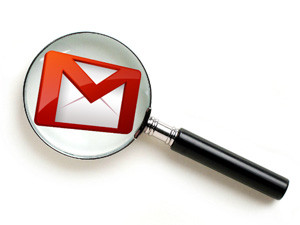
Gmail addresses, which have become ubiquitous with Web-based e-mail services, will be key to a host of pending future services and much more closely linked to online identities as the service enters its second decade.
In the pipeline are enterprise cloud offerings, which will be linked to enterprise Gmail accounts, which are set to make Gmail an even bigger draw card beyond its more than 400 million current users.
In addition, Gmail could be used as the key to access a host of other possible services, allowing its Internet giant parent to take on other content storage providers, such as Instagram.
The e-mail service marked its 10-year anniversary this week with shareable selfies, a tool that allows users to post pictures of themselves, taken via a Web cam, as their background theme and also to share the images.
Filling a need
Gmail started out as an invitation-only service on 1 April 2004 and rapidly expanded to become the most used Web-based e-mail client, with more than 400 million users. As the Internet giant has a history of using April Fool's Day to launch hoax products, Gmail was initially viewed as one such hoax.
Arthur Goldstuck, MD of World Wide Worx, says it did not start out as the gold standard as there were already other offerings like Hotmail and Yahoo. However, Gmail has quickly become a success, because it designed its offering around what people wanted, which the other services did not, he notes.
Google co-founder Larry Page said 10 years ago that the inspiration for the service came from a Google user complaining about the poor quality of existing e-mail services.
"She kvetched about spending all her time filing messages or trying to find them," Page said. "And when she's not doing that, she has to delete e-mail like crazy to stay under the obligatory four megabyte limit. So she asked: 'Can't you people fix this?'"
Gmail's history of April Fool's Day jokes
2007: It poked fun at paper-based archiving by introducing Gmail Paper, through which users could click a button and Google would send a paper copy of a mail through the postal service.
2008: It launched the fake Gmail Custom Time, which purported to offer users up to 10 e-mails a year that would be sent with false timestamps.
2009: Issued Gmail Autopilot, which would automatically respond to messages.
2010: It 'disemvowelled' Gmail's English-language home page, including its logo.
2011: Gmail Motion purported to allow users to navigate, send and dictate e-mails through users' physical action via Web cam.
2012: Gmail Tap, which claimed to double typing speed.
2014: Gmail Blue, giving the mail service additional features and turning it blue.
Source: Wikipedia
After its launch, Hotmail quickly moved to increase users' data capacity from 2MB to 250MB to compete with Gmail's 1GB offer. Goldstuck notes that service has all but disappeared, and Yahoo has radically redesigned itself to compete with Gmail.
Goldstuck says there has been constant evolution at Gmail, to the point where it is now taken seriously as a business e-mail, and not a source of spam. He says its move to allow people to use it as a mail-hosting service was a "real breakthrough".
Gmail has become the glue that holds together a variety of online presences and activity, and is key to the use of other services, such as G+, YouTube and Gmail Drive, says Goldstuck. He notes its move to take Amazon on in the cloud space will make the mail service more compelling for enterprises.
Goldstuck says business will be able to link Gmail addresses to the enterprise cloud space, which is a "no-brainer". He also expects to see Google enter the virtual store space with an iTunes-like offering, as well as compete with others who offer content.
Gmail is an entry point to link to other services, such as documents, and is becoming core to online presences, says Goldstuck. He anticipates many other services requiring people to sign in either through a Gmail account or Facebook account, because these services will have done all the "heavy-lifting" around verifying identifies.
Dark side
However, Gmail has not been without its problems, with at least 10 outages over the past decade, some of which left users - consumers and businesses - unable to access e-mail and calendars for two-and-a-half hours.

"If a Google user has a problem with e-mail, well, so do we," said Google co-founder and president of technology Sergey Brin. "And while developing Gmail was a bit more complicated than we anticipated, we're pleased to be able to offer it to the user who asked for it."
In addition, it has come under criticism over its privacy policies. Social media lawyer Paul Jacobson writes that services such as Gmail have the option of accessing personal data, because users agreed to this when they accepted its privacy policy.
Goldstuck says people should be aware that anyone who creates an online presence cannot have secrets from law enforcers if they are suspected of criminal activity. However, Google has made little privacy intrusions in the past, which has caused a backlash, and this could harm its reputation, notes Goldstuck.
There is no question that there are large question marks over privacy, Goldstuck adds. Yet, people are happy to put up with an invasion of privacy to get value from Gmail, he says.
Share